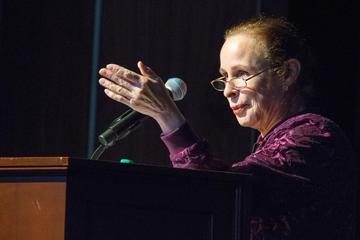
02/25/2020
Perhaps no one has as unique a perspective on the social and political history of Cuba than Alina Fernández.
Fernández, the daughter of Cuban communist revolutionary leader Fidel Castro, became a critic of her father’s government and obtained political asylum in the United States in 1993.
She will speak at 8 p.m. on Wednesday, March 11 in Old Main Brown Auditorium. The event, “An Evening with Alina Fernández, Daughter of Fidel Castro,” is free and open to the public.
Fernández will comment on her first-person account of growing up in Cuba as well as her decision to flee the country and how recent political reforms may shape U.S.-Cuban relations in the future.
Sophia Hall, a junior history and anthropology major from Copiague, N.Y., helped organize the event as a member of the Student Activities Board. She was initially looking to book a comedian or entertainer for this semester, but changed her thinking to a more serious tack after hearing Yusef Salaam, one of the exonerated members of the Central Park 5, speak to a capacity crowd in Brown Auditorium last semester.
“I saw the response to Yusef Salaam when he came and that made me realize that this would be something campus wanted,” Hall said. “Our task at Student Activities Board is to do things that the rest of campus wants and put on events for the rest of campus. I realized that the campus does want something that goes in this direction that isn’t necessarily a comedian or a performer.”
Another inspiration was Hall’s older sister, Grace Hall ’17, who majored in adolescence education: social studies and history and visited Cuba as a study abroad student while at Cortland. Her stories from that trip in part led to Sophia Hall to pursue history herself.
She hopes that Fernández’s talk will illuminate a poignant period in Cuban history.
“I have a particular interest in the time of the Cold War and American history in general,” Hall said. “It’s interesting how smaller countries are used as a pawn by bigger countries. It’s interesting to hear the stories from those smaller countries specifically. You hear so much about the U.S. side and the U.S.S.R. side and you don’t hear the stories from the people who were living at that time.”
Born three years before the Castro revolution in 1959, Fernández became an anti-communist activist by the 1980s. She condemned the Cuban government for food shortages, economic collapse and political and cultural repression.
In 1993, Fernández obtained a Spanish passport, donned a costume and posed as a Spanish tourist to board a plane bound for Madrid. She was soon thereafter granted political asylum in the U.S.
Fernández authored a 1998 autobiography, Castro’s Daughter: An Exile’s Memoir of Cuba.
“I wanted him to find a solution to all the shortages: of clothes, of meat, so it could again be distributed through the ration books,” she wrote. “I also wanted to ask him to give our Christmas back. And to come live with us. I wanted to let him know how much we really needed him…”
Ultimately settling in Miami, Florida, Fernández has written columns for el Nuevo Herald, hosted local radio programs and toured college campuses across the country.
In her talk, she aims to present snapshots of Cuban society, an inside look at Cuban politics and a detailed and personal view of her father.
The event will be followed by a question-and-answer session.
“It’s a really unique experience that you’re not often going to get, especially for free,” Hall said. “So often we hear stories from bigger politicians, so to be able to hear the story from someone who actually lived it so personally I think is really cool.”
Cuba is of particular interest to many Cortland faculty and students, who for several years have traveled to the island on academic trips focused on disciplines ranging from art and art history to sport management. Miguel Fraga, the former first secretary of the Cuban embassy in Washington, D.C., visited SUNY Cortland and spoke with students in 2016.
The event is sponsored by the Student Activities Board.